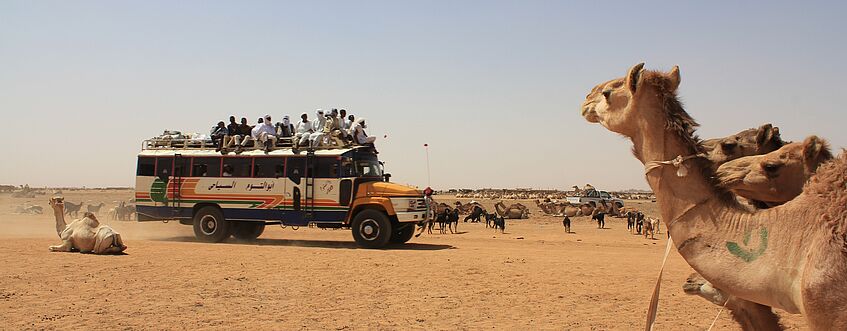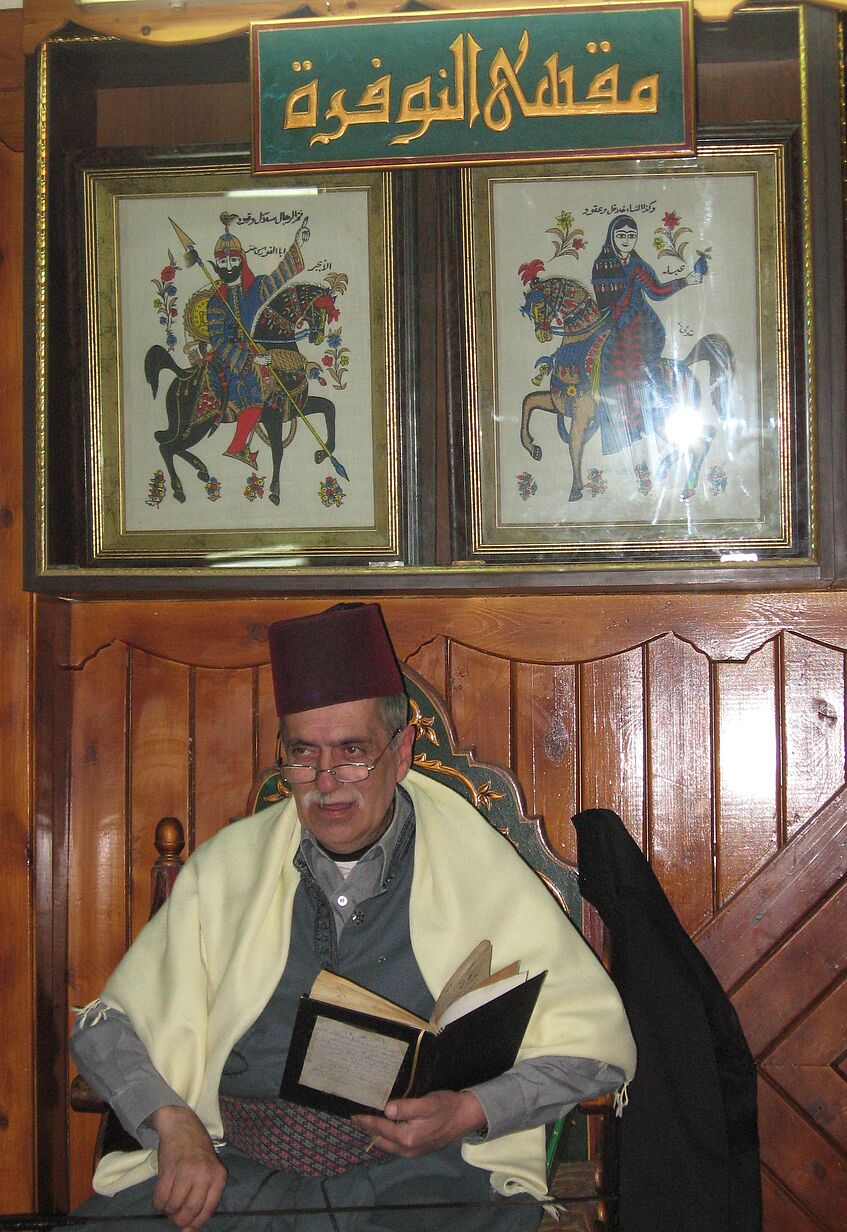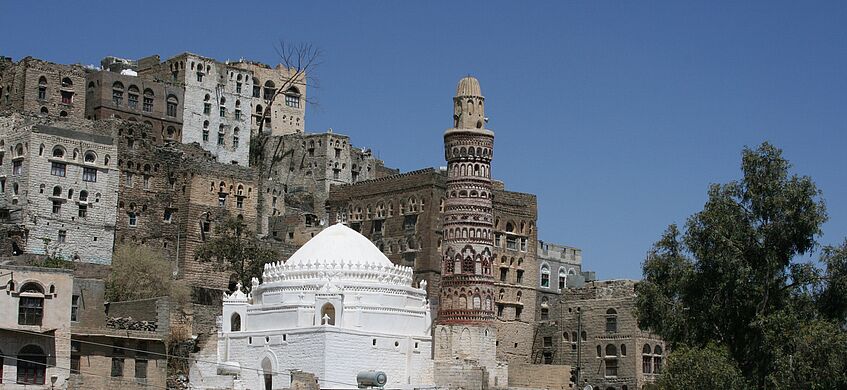Arabic Studies in Vienna
Arabic Studies in Vienna has a focus on philology and cultural history, encompassing both pre-modern and modern eras of Arabic language and intellectual history. Special emphasis is placed on linguistically oriented teaching and research on the modern spoken varieties of Arabic on the one hand, and on the study of and research on the history of philosophy, kalām and medicine on the other hand (with special focus on manuscript tradition).
In both areas, the Section of Arabic Studies at the University of Vienna is among the leading international academic institutions. The high professional quality is reflected in the considerable number of research projects that have been competitively acquired from third-party funds in recent years.
A third focus is on the history and cultural history of ancient South Arabia (particularly Yemen).

Camel market of Omdurman, Sudan @ Stephan Procházka
Research foci of Arabic Studies in Vienna
Arabic dialectology
The study of spoken Arabic varieties at the University of Vienna dates back to the 1970s and has developed continuously since then. The various regional dialects represent the actual mother tongue of almost 300 million Arabic-speaking people and deserve scientific attention as dynamic and communicatively used varieties. Currently, five different dialects as well as Maltese are taught at the Department. In this respect, Vienna is internationally only surpassed by the INALCO University in Paris. In addition to comparative studies of Arabic dialectology and contact linguistics, there are several regional focuses: Veronika Ritt-Benmimoun currently heads the third major research project on Tunisian dialects at the Institute. Stephan Procházka’s research is particularly dedicated to the study of Arabic minority dialects in southern Turkey and – in cooperation with the linguist Utz Maas (Univ. Graz) – to the dialects of Morocco. Ana Iriarte Díez is a renowned expert in the field of syntax with a special focus on the dialects of Lebanon and Syria. The Arabic dialects spoken in the Iranian province of Khuzestan are currently being studied by Bettina Leitner, who is also working on the dialects of the eastern Gulf Coast in a research project recently approved by the FWF together with the linguist Dina El Zarka (University of Graz).
A long-term project run collectively and in cooperation with the Austrian Centre for Digital Humanities and Cultural Heritage (ACDH-CH) of the Austrian Academy of Sciences (Director Dr. Karlheinz Mörth) is VICAV. The Vienna Corpus of Arabic Varieties is an innovative project offering a platform for various research areas of Arabic dialectology. The cooperation with the ACDH-CH guarantees that the high standards in the field of digital humanities are maintained. VICAV is committed to the policy of open access and is aimed at both researchers and students. In addition to various text corpora, it currently includes three electronic dictionaries and probably the most comprehensive digital bibliography on Arabic dialectology (4,500 titles).
Comprehensive textbooks for Syrian Arabic published by staff members of the Department have been in use for teaching for several years. Textbooks on Iraqi Arabic as well as on the dialects of Tunis and Cairo are currently in preparation.
The field of Arabic dialectology is strongly integrated into the international research landscape. In addition to the intensive cooperation in projects, all scholars are active members of the Association Internationale de Dialectologie Arabe (Paris). Veronika Ritt-Benmimoun is one of five members of the Executive Board of this important association; Stephan Procházka was its president from 2004 to 2015.
Arabic Popular Culture

Traditional storyteller in a coffeehouse in Damascus @ Stephan Procházka
Arabic Popular Culture
Closely linked to the focus "Arabic Dialectology" are research projects on popular culture in the Arab world. Everyday and popular culture are almost exclusively articulated in the regional dialects. On the one hand, these include traditional genres such as songs or orally transmitted poetry. These genres of everyday culture in the Bedouin societies of southern Tunisia are one of the research focuses of Veronika Ritt-Benmimoun, who is investigating both traditional women's poetry and men's poetry in their social contexts.
On the other hand, the dialects are also vehicles of a rich pop-culture, which manifests itself especially in music. In this context, Gisela Kitzler does research on šaʕbi and mahraganāt music, two genres of Egyptian popular music. Arabic popular culture is often controversially discussed and associated with concepts of identity, partly because of the language variety in which it is articulated. Therefore, language attitudes are also part of this focus.
A separate area of popular culture is represented by the phenomena of popular religion, which Stephan Procházka has studied primarily with regard to Tunisia and (in cooperation with Gisela Procházka-Eisl) the Alawite communities in southern Turkey.
History of Arab Philosophy, Kalām and Medicine
Within the focus on intellectual and textual history, the central aspects are: the Arabic reception of Greek science (Graeco-Arabic Studies); the development of philosophy, rational theology (Kalām) and medicine in Arabic, especially in the period from the 9th to the 15th century. In addition, the handwritten transmission of the corresponding texts is important. In the Graeco-Arabic area, the main focus is on translation literature from the middle of the 8th century to the beginning of the 11th and the development of Arabic technical terminology. The content-related examination of classical Arabic texts focuses on philosophical, theological and medical views and their mutual influence. Special attention is also paid to Christian-Arab scholars such as the translator of Galen and physician Ḥunayn ibn Isḥāq or the commentator of Aristotle and Galen and theologian Ibn al-Ṭayyib. In order to be able to access previously unedited text material and take it into account in research, manuscript studies (paleography and codicology) and editing activities are essential. Manuscripts are also regarded as material objects that have often been read, annotated and passed on for centuries.
Elvira Wakelnig's current research focuses on the beginnings of Arabic philosophy, its anchoring in the late classical tradition and, above all, the hitherto neglected importance of the introductory literature in the form of prolegomena. As Arabic examples of this prolegomena literature, the edition, translation and study of Ibn Bahrīz’s Definitions of Logic as well as an anonymous and untitled text collection from a Tehran manuscript are in preparation. In addition, the ambiguity of various Arabic technical terms will be investigated, such as the concept of nature in the Arabic Galen translations and the Arabic treatises based on them.
Within the framework of the French-Austrian research project GAIA (Galen in Arabic - More than a Translation) the edition of the Alexandrian Ǧawāmiˁ of the Galen script Ḥīlat al-burˀ by Ghadeh Bekir as well as the edition and German translation of the Masāʾil fī l-ṭibb (in the form of tree diagrams) by Ḥunayn ibn Isḥāq by Ruth Hammerschmied are currently being prepared at the Department.

Syriac manuscript in Mor Gabriel monastery, Eastern Anatolia @ Stephan Procházka
Cultural Area Southern Arabia
This focus, which has existed for about ten years, is mainly supervised by George Hatke. The focus is on pre-Islamic Yemen, ancient and medieval Ethiopia and cultural relations between the two sides of the Red Sea. His research therefore covers the history of the Red Sea in antiquity, comparative Semitic philology, long-distance trade and religious ideology in the Semitic-speaking world in antiquity.

Old town of Jiblah with the mosque of Arwa bint Ahmad, Yemen @ Stephan Procházka
